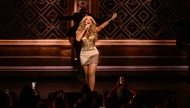
Wind/Pinball: Two Novels By Haruki Murakami, $26.
Haruki Murakami had been one of those authors I’d read much about without actually reading his work. So hearing that Knopf planned to publish translations of two early novellas coveted by Murakami cultists, I figured, where better to start than at the beginning? Usually, I try to read as much as possible by an author in addition to the book I am reviewing. But I wanted to come at Hear the Wind Sing and Pinball, 1973 as the first offerings of a new novelist.
Murakami himself, now 66, looks back in Wind/Pinball, writing about early adult life from the vantage of age 29. He explains in a contemporary introduction that the motivation to write novels struck him when he witnessed an American player for the Yakult Swallows hit a double in the team’s 1978 season opener. Baseball crops up in both stories without rising to motif status, but the author’s inability to explain how a base hit propelled him into literature is telling in itself. Events in both novellas often seem pointless, echoing in the hollow lives of the young characters, particularly the unnamed first-person narrator and his friend The Rat.
Murakami ignores conventions of traditional Japanese stories, but the two principal characters of these novellas live such Americanized lives of cars, sex and rock that a reference to chopsticks stands out. The narrator mentions meeting a girlfriend at a student demonstration, and that’s enough to settle these characters into the post-’60s malaise nursed by their generation worldwide. But Murakami’s characters negotiate adulthood in a land that embraced American commercialism as the antidote to traditions tainted by militarism, so their lives are not merely empty but abysmal.
Although references to Hitler and Auschwitz are tactless distractions, World War II hovers as a source of displacement—The Rat looks like a flying ace, a pinball machine is like an old fighter plane. And Murakami is an analogy master. Even awkward metaphors are redeemed by astute imagery. “The undulating hills resembled a giant sleeping cat, curled up in a warm pool of time,” the narrator observes at one point, and you sense his cascading analogies themselves represent a groping for unanchored meaning. The narrator, who in Pinball lives with sweetly vacuous, nameless twin lovers, also spends time in bed with Kant’s Critique of Pure Reason.
So what of this young author? A promising start. I look forward to reading more of his work.
Find more by Chuck Twardy at chucktwardy.com.







